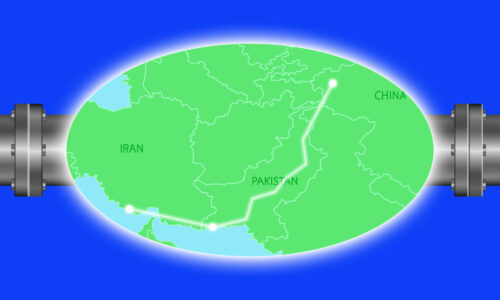China wants to compete with Elon Musk’s Starlink
Elon Musk sells satellite internet to Ukraine and Africa. Could he do it for Taiwan? Meanwhile, China is rushing to catch up to SpaceX and Starlink, and it might be the thing that sets Elon against his Beijing buddies.

Elon Musk met Chinese Vice Premier Dīng Xuēxiáng 丁薛祥 in Beijing on May 31. The very next day, the U.S. Department of Defense awarded the Tesla founder and CEO’s SpaceX Starlink satellite network a contract for high-speed internet in Ukraine.
As Ukrainian soldiers fought to repel invading Russians, the world’s richest person was perhaps trying at once to protect the 22% of Tesla’s revenue derived from China sales in 2022 while explaining to the sixth-highest-ranking Chinese Communist Party official why a sister company’s tech would be used in a war against Beijing’s “no-limits partner.”
In a direct challenge to Musk’s Starlink internet services, for both civilian and military communications, China, which views Taiwan as Russia views Ukraine — a territory to be retaken — is developing its own “Guowang” (国网 guówǎng, or “national network”), a constellation of satellites in low Earth orbit able to provide broadband internet.
“In Ukraine, Starlink has demonstrated its relevance and utility in an active conflict situation,” Ian Christensen, a director at the space race watchdog organization the Secure World Foundation, told The China Project. “China has noticed and put a little bit more impetus behind trying to get the Guowang constellation really under development.”
China news, weekly.
Sign up for The China Project’s weekly newsletter, our free roundup of the most important China stories.
Whose side will Musk be on?
As Ukraine’s besieged military maintains communications using Starlink internet — paid for with private donations and U.S. foreign aid before the Pentagon stepped up to foot the monthly bill of $20 million — the self-ruled island of Taiwan is considering developing its own satellite internet network. This would be a big lift for its small but ambitious space program. Meanwhile, in March, U.S. lawmakers discussed helping to bring Starlink to Taiwan.
Taiwan is facing a rise in Chinese cyberattacks. Satellite internet provides better coverage, faster speeds, and greater security when compared with undersea cables and terrestrial relay towers that are vulnerable to attack.
If China invaded Taiwan, Tesla could be kicked out of China. Musk could then move to make up for the loss of revenue with another Pentagon contract to do for Taiwan what Starlink did for Ukraine.
Chinese researchers in May published a paper suggesting that the People’s Liberation Army should develop a strategy to counteract, and even destroy, Starlink.
So, if China attempted an invasion of Taiwan, could Musk’s Starlink really provide the U.S. ally’s defense forces with high-speed satellite internet?
“Yes, if [Musk] not doing so costs him more,” Dan Harris, an American lawyer with decades of experience practicing in China, told The China Project. “This is the issue of our era. You’ve got these multinationals that on the surface act like they would like the world to believe they are ethical actors but, really, are mostly tasked with, and view their role as, seeking profits wherever they can.”
A SpaceX spokesperson did not respond to a request for comment.
If a crisis around Taiwan resulted in conflict between two countries with thousands of communications satellites in orbit, there’s some evidence that the networks could be used to counter one another, said Kevin Pollpeter, senior research fellow at the national security research non-profit CNA.
“There have been some complaints that Starlink could interfere with other communication satellites,” he said. “I suppose it’s possible that there could be a way to position Guowang in such an orbit that it could interfere with the signal coming from Starlink satellites.”
But more broadly, constellations like Guowang and Starlink would greatly increase the resiliency of militaries’ communications capabilities due to the sheer number of satellites.
“It puts some new complications into how you actually want to counter those systems, because before we had just a few satellites, and you could take them out, and then you can pretty much take out that capability,” said Pollpeter. “Now, it’s not so easy.”
A new front in U.S.-China competition
China’s answer to Starlink, Guowang, is managed by China Satellite Network Group Co., Ltd., or SatNet for short.
SatNet was created in April 2021 as a state-owned enterprise, one year after China’s powerful National Development and Reform Commission added satellite internet to a list of important information infrastructure, and a month after China’s 14th Five-Year Plan reiterated the need for high-speed, ubiquitous information infrastructure that promotes “space-Earth integration” (天地一体).
China’s effort to put nearly 13,000 Guowang satellites into low Earth orbit has implications far beyond the Taiwan Strait, creating a new front in the U.S.-China struggle for global influence. China hopes to launch more than three times the number of satellites Starlink currently operates (3,700). SpaceX has said it plans eventually to have 42,000 satellites in its Starlink network, all of which currently are launched from the U.S.
China’s investments into Guowang include the development of two new launch sites that will help send its satellites into orbit. One of those sites, located on the island of Hainan off the coast of southern China, is part of a broader commercial space hub that will provide business for private satellite manufacturing, rocket launches, and other commercial space companies.
The Hainan site — a joint venture between SatNet and two other major SOEs, space contractor CASC and aerospace military contractor CASIC — plans to launch its first satellite early in 2024, which could be the first send-off of the Guowang project.
The pay-to-play aspect of the new launch sites is critical, as China’s national space program and its series of Long March rockets can only propel a small fraction of the thousands of satellites slated to reach Earth’s orbit each year. For the rest, China will rely on private firms that have absorbed hundreds of millions of dollars in recent investment.
“The state builds a lot of rockets, but almost all of those rockets are spoken for by national missions,” Blaine Curcio, Euroconsult’s lead analyst on China’s space sector, told The China Project. “There’s this inherent shortage of supply that’s been witnessed historically in the Chinese launch sector, and I think that has attracted money.”
Companies are rushing to fill the gap, Curcio said, but they have a while to go before they will be launching thousands of satellites.
Chasing SpaceX
Only a handful of Chinese commercial launch companies have put satellites into operation successfully. Most recently, CAS Space, partly backed at its start in 2018 by the Chinese Academy of Sciences, launched 26 satellites into orbit, marking its second launch and setting a record for the most satellites included in any single launch.
Private Chinese companies Space Pioneer, iSpace, and Galactic Energy also all have launched satellites into orbit successfully. Orienspace plans to have its first launch by the end of 2023.
While China’s commercial launch sector shows progress, it has a long way to go to catch up to SpaceX when it comes to rocket technology and launch frequency.
“SpaceX is in a league of its own,” Curcio said. “No Chinese commercial, or even state-owned launch company really compares in terms of cadence. It’s pretty remarkable, and I say that as a longtime skeptic of the company and of Elon Musk.”
How long until China might be able to produce a company on par with SpaceX?
“That will take seven to 10 years, maybe,” Curcio said.
Elon Musk vs. China in Africa
In January 2023, SpaceX said that Starlink was accessible in Nigeria, marking its first availability in Africa, news many welcomed as a boon for developing countries. Since then, Starlink has expanded to Rwanda and Mozambique, with plans to continue spreading across the continent. But it is still more expensive up front than existing alternatives: As of March 2023, an individual subscription to Starlink in Nigeria cost $599 for installation and a monthly subscription fee of $43. Conventional internet provider FiberOne charged $68 for installation and $87 per month thereafter for high-speed access, and less for more basic access. Rural customers who cannot access FiberOne would stand to benefit from Starlink, but would be less likely to be able to pay for it.
Widespread internet is a game changer for developing countries, and access via Guowang satellites would complement China’s foreign investment in infrastructure projects via Beijing’s Belt and Road Initiative.
“China clearly is trying to describe itself as a global leader, offering a set of services, capabilities, and partnerships that behoove its vision,” Christensen said. “Adding [satellite internet] to that suite fits.”
If Guowang and SpaceX/Starlink compete for business in developing economies, it could push the price of internet access down for those who stand to benefit most.
“The U.S. and China are fighting for the hearts and minds of the entire world right now,” Harris said. “That’s going to involve these satellites.”
While China’s Guowang has global implications, there also are plenty of domestic reasons to want to pursue the program.
“They’ve got vast rural areas and an underserved population that providing connectivity to is a valid motivation,” Christiansen said. “This is part of the overall picture, but it’s often not talked about as much because the geopolitical stuff is more interesting.”
Additional sources and data
SpaceX’s Starlink wins Pentagon contract for satellite services to Ukraine / Reuters
Taiwan is planning a satellite internet service amid China invasion fears after seeing how much Elon Musk’s Starlink has helped in Ukraine / Yahoo! Finance
US lawmakers discuss Starlink in Taiwan talks / Taipei Times
Chinese Researchers Publish Strategy to Destroy Elon Musk’s Starlink / Gizmodo
Chinese commercial rocket firm launches 26 satellites, sets national record / Space News
Guo Wang: China’s Answer to Starlink? / RUSI
China’s Answer to Starlink / The China Space Monitor
火箭“工位”准备中 海南商业航天发射场项目最新进展 / 大众报业
Companies
China Satellite Network Group 中国卫星网络集团
CASIC 中国航天科工集团
CAS Space 中科宇航
Space Pioneer 天兵科技
iSpace 星际荣耀
Galactic Energy 星河动力
Orienspace 东方空间






